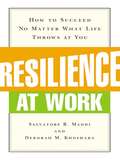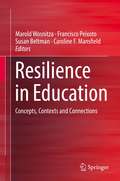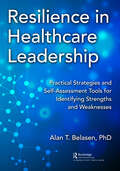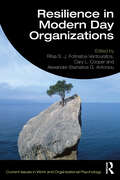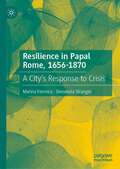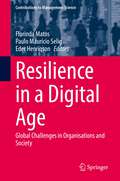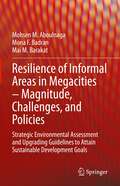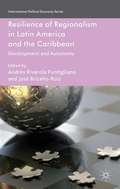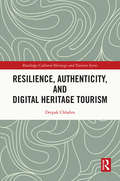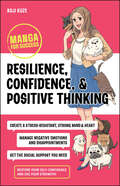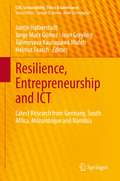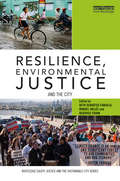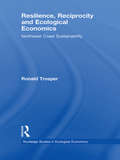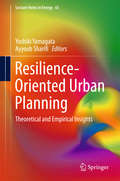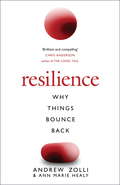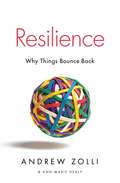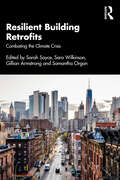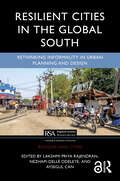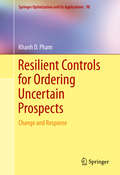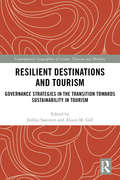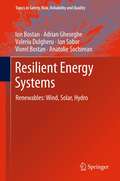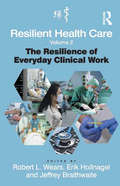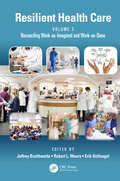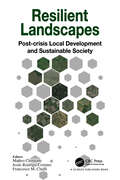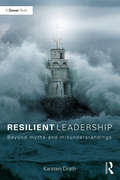- Table View
- List View
Resilience at Work: How to Succeed No Matter What Life Throws at You
by Salvatore R. MADDI Deborah M. KHOSHABAThis useful resource gives you the knowledge, tools, and encouragement you need to embark on your journey to becoming a hardier, more successful person. More than experience or training, resilience in the face of stressful situations and rapid changes determines whether you ultimately succeed or fail in the workplace. It allows you to thrive even in tumultuous conditions, to turn potential disasters into growth opportunities. The good news for the legions of other workers who become overwhelmed by stress is that resilience in the face of life&’s problems is not an inborn personality trait, but a set of skills and attitudes that you can learn and develop.Packed with insightful examples, case studies, and self-assessment tools, Resilience at Work explains how to:Approach change as a meaningful challenge no matter how stressful the circumstances, and stay committed to your work, rather than detaching and giving up.Gain control by understanding the upside and the downside of change, and take actions to influence beneficial outcomes.Turn stressful changes to your advantage and map out sound problem-solving strategies.Resolve ongoing conflicts and build an environment of assistance and encouragement between you and your coworkers.Decrease feelings of isolation and powerlessness by understanding the 3Cs that give you the ability to thrive amid disruptive changes: commitment, control, and challenge.Reorganization, downsizing, mergers, budget pressures, transfers, job insecurity, and more are producing today&’s unpredictable, pressure-cooker conditions, and making it harder for less resilient people to achieve the success they deserve. Resilience at Work supplies insights and strategies you can use to combat your fear of change and uncover the opportunities that can be found in even the most stressful situations.
Resilience in Education: Concepts, Contexts and Connections
by Marold Wosnitza Francisco Peixoto Susan Beltman Caroline F. MansfieldThis volume focuses on resilience in educational contexts which has emerged as an important field of research, with recent investigation into resilience of school students teachers, and post-secondary students and staff. The book integrates theoretically diverse viewpoints and research advancing relevant theory. It furthermore presents interventions which aim enhancing resilience in the educational context. The interplay between more basic research and actual practice in the classroom, university or workplace enriches relevant theory and research. Each chapter includes an explanation of how resilience is conceptualized in the research and the methods used to examine resilience. The chapters also provide a description of the context in which the research was conducted and how particular aspects of context influence the resilience process. Innovative approaches to exploring resilience are highlighted as well as directions for future research.
Resilience in Healthcare Leadership: Practical Strategies and Self-Assessment Tools for Identifying Strengths and Weaknesses
by Alan Belasen, PhDThe COVID-19 Pandemic has been an ultimate challenge for leadership resiliency. Resilient leaders are thoughtful and deliberate. They balance logic and emotion, ego and humility. They lead through compassionate empathy by focusing on the ‘how’, not only the ‘what’. They use their influence to drive positive change, diversity and inclusion, and create an equitable community. Most books on resilient leadership appear to focus on spirituality and tools to grow an “unshakable core of calm, strength, and happiness” or “bounce back without getting stuck in the toxic emotions of guilt, false guilt, anger, and bitterness”. These books are very similar to handbooks focusing on mental toughness and providing guides for overcoming adversity and managing negative emotions. This book, however, defines resilience as a critical competency of high-performing leaders. Leaders must cultivate resilience in themselves and foster it throughout their organizations and multidisciplinary teams in order to adapt and succeed. Resilience in Healthcare Leadership is differentiated by offering practical strategies and self-assessment instruments for identifying strengths and weaknesses and for developing and sustaining the performance of resilient leaders. The book will also focus on best practices to help build a talent pipeline and develop resilient care team leaders to effectively manage the challenges of disruptive environments. Whether senior or mid-level manager the reader will learn to apply knowledge and skills to initiate cultural change, assess strengths and weaknesses, align leadership roles with organizational goals, and position themselves to become a resilient leader. The reader will also learn how to identify message strategies consistent with stakeholders’ needs, resolve conflicts, lead multidisciplinary teams, and realize the impact of resilient leadership in influencing outcomes. Takeaways and tools are included to guide progressive learning and leadership development and build a strong succession pipeline, to help organizations become more prepared to respond to challenges facing healthcare leaders in the future.
Resilience in Modern Day Organizations (Current Issues In Work And Organizational Psychology Ser.)
by Cary L. Cooper Fotinatos-Ventouratos, Ritsa S. J. Antoniou, Alexander-Stamatios G.This international and thought-provoking volume addresses both theoretical and conceptual issues of resilience in modern organizations, looking at areas of concern and providing suggestions for future preventative measures. In recent years, organizations across the world have been subjected to major upheavals as several crises, including the COVID-19 pandemic, the World Economic Crisis, and the Migratory Crisis, have contributed to the changing landscape of work. Individuals, organizations, and societies have been forced to re-think, re-adjust, and re-align in the face of adversity. The “survivors” of such upheavals are those who come to grips with the new realities of our times and encompass resilience in its entirety. This timely collection assesses resilience on critically important variables, such as socio-economic status, occupational type, and gender differences, and highlights preventative measures that organizations and individuals should take to maximise wellbeing and adjustment in these everchanging and challenging times. Essential reading for students, scholars, practitioners, and policy makers, this volume sheds light on the multi-faceted ways to enhance the resilience paradigm and offers insights into implications for future research in the area.
Resilience in Papal Rome, 1656-1870: A City's Response to Crisis
by Donatella Strangio Marina FormicaThis book analyses the evolution of the city of Rome, in particular, papal Rome, from the plague of 1656 until 1870 when it became the capital of the Kingdom of Italy. The authors explore papal Rome as a resilient city that had to cope with numerous crises during this period. By focusing on a selection of different crises in Rome, the book combines cultural, political, and economic history to examine key turning points in the city’s history. The book is split into chapters exploring themes such as diplomacy and international relations, disease, environmental disasters, famine, public debt, and unravels the political, economic, and social consequences of these transformative events. All the chapters are based on untapped original sources, chiefly from the State Archive in Rome, the Vatican Archives, the Rome Municipal Archives, the École Française Library, the National Library, and the Capitoline Library.
Resilience in a Digital Age: Global Challenges in Organisations and Society (Contributions to Management Science)
by Florinda Matos Paulo Maurício Selig Eder HenriqsonIn recent years, decision-makers from all sectors have been using 'resilience' as a keyword for managing societal turbulences. But what is resilience? How can we benefit from integrating digital transformation and resilience? In this book, some of the world's leading experts on resilience explore the issue and discuss possible answers to these questions. The editors of this book believe that resilience is the master key for the future. However, they also remind us that people are at the base of any process of resilience and, only by placing people at the center of transformation, can we aspire to have resilient organizations and a resilient society.
Resilience of Informal Areas in Megacities – Magnitude, Challenges, and Policies: Strategic Environmental Assessment and Upgrading Guidelines to Attain Sustainable Development Goals
by Mohsen M. Aboulnaga Mona F. Badran Mai M. BarakatThis book focuses on the socio-economic and sustainability challenges facing megacities in dealing with the dramatic population increases of informal areas and settlements (or slums), especially when coupled with the impacts and risks of climate change. The authors examine informal urban areas globally and in developing countries utilizing strategic environmental assessment (SEA) as a tool to solve the sequence of upgrading steps concerning slums and shanty towns, and also establish essential guidelines for local governments and stakeholders to create a balance and quality of life for slums dwellers, particularly in the age of the COVID-19 pandemic, through applying sustainability indicators that enhance the upgrading process. Coverage includes recent statistics and mapping of informal areas worldwide and assessment of the GIZ and Sir Norman Foster models in terms of energy demands and consequential emission of CO2 and air pollution from slums. Three models of Maspero’s Triangle are also studied and assessed. The book is essential reading for a wide range of researchers, students, policymakers, governments, and professionals as well as a good source for research centers and academicians working in energy, climate change, urban environments, and sustainable urban development.
Resilience of Regionalism in Latin America and the Caribbean: Development and Autonomy (International Political Economy)
by Andrés Rivarola Puntigliano José Briceño-RuizAs regionalisation becomes an increasingly hot topic, the authors explain why regionalism has been most successful in Latin America and analyse current processes and opinions of possible future developments in the region, including the Caribbean, Central America, Brazil, and Mexico.
Resilience, Authenticity and Digital Heritage Tourism (Routledge Cultural Heritage and Tourism Series)
by Deepak ChhabraThis book examines the authentication of authenticity in heritage tourism by using a resilient smart systems approach. It discusses the emerging trends in cultural tourism and outlines, in a detailed manner, their significance in negotiating authenticity in tourism experience. Authentication of authenticity is an evolving, less-researched field of inquiry in heritage tourism. This book advances research on this subject by exploring different authentication processes and scrutinizes their resilience in building transformative heritage tourism pathways. It offers a kaleidoscopic view of the manner authenticity has evolved over the last several decades by observing a broad spectrum of cultural expressions. The evolution and meaningfulness of negotiated authenticity is identified and discussed in the context of pre-, intra- and post-pandemic times. This book focuses on the moral and existentialist trajectories or authenticity and the notion of self-authentication. It proposes a smart resilient authentication model to delicately negotiate the objective and self-dimensions of authenticity in transformative times. Furthermore, by sharing examples of best practices, it offers unique insights on how authenticity is authenticated and mediated via digital platforms and artificial intelligence. This book offers novel perspectives on negotiated authenticity and its authentication in heritage tourism and will appeal to both practitioners and students/scholars in Heritage studies; Design and Innovation; Tourism Studies; Geography and Planning across North America, Europe, and East-Asian countries.
Resilience, Confidence, and Positive Thinking: Manga for Success (Manga for Success)
by Koji KuzeStrengthen your confidence, positivity, and resilience with Manga for Success! Resilience, Confidence, and Positive Thinking: Manga for Success will show you how to change your perspective to improve your wellbeing. This manga tells the story of Reisa, who recently started a new job at an advertising agency. Overwhelmed and stressed by the new workload and criticism from her boss, her mental health starts to suffer. One day, Reisa runs into Tsuyoshi, an old college friend. Captivated by Tsuyoshi's strong self-esteem and confidence, she asks for his advice. To help Reina relieve her mental fatigue, break out of her negative mindset, and rebuild her confidence, Tsuyoshi suggests resilience tips he adopted abroad. Following his advice, Reina addresses the roots of her habitual negativity, begins to positively control her emotions, starts to turn around her relationships with her peers, and becomes the best version of herself. Understand the principles of positive psychology and resilience, including Bandura’s self-efficacy theory, and learn how they can easily be applied in your life Learn how to watch out for emotional vampires, build your self-empowerment, and control negative emotions Gain skills for overcoming negativity and disappointments, while building a strong mind and heart Discover why manga for businesspeople is so wildly popular in Japan, China, Korea, and elsewhere. Resilience, Confidence, and Positive Thinking: Manga for Success is fun to read—and it could just change your life!
Resilience, Entrepreneurship and ICT: Latest Research from Germany, South Africa, Mozambique and Namibia (CSR, Sustainability, Ethics & Governance)
by Jorge Marx Gómez Jantje Halberstadt Jean Greyling Tulimevava Kaunapawa Mufeti Helmut FaaschThis book is based on the work of the YEEES Research Centre, an international network of scientists from partner universities in Germany, Mozambique, Namibia and South Africa. It presents inter- and transdisciplinary research that explores different ways of understanding resilience, an essential characteristic for systems, organizations and people – providing them with strength in the face of attacks and challenges, and both enabling and fostering constant adaptation and improvement. Building resilience to face today’s ever-changing societal and environmental realities requires unbiased research activities that transcend the borders of countries and academic disciplines alike. The research addressed in this book, thus, is multidisciplinary and includes contributions to areas such as sustainable agriculture, entrepreneurial ecosystems, and smart communities, as well as groundbreaking work on skills development and ICT education. Highlighting the variety of research activities and their outcomes, this book offers a valuable resource for researchers and practitioners in the fields of sustainable resilience development.
Resilience, Environmental Justice and the City (Routledge Equity, Justice and the Sustainable City series)
by Beth Schaefer Caniglia Manuel Vallee Beatrice FrankUrban centres are bastions of inequalities, where poverty, marginalization, segregation and health insecurity are magnified. Minorities and the poor – often residing in neighbourhoods characterized by degraded infrastructures, food and job insecurity, limited access to transport and health care, and other inadequate public services – are inherently vulnerable, especially at risk in times of shock or change as they lack the option to avoid, mitigate and adapt to threats. Offering both theoretical and practical approaches, this book proposes critical perspectives and an interdisciplinary lens on urban inequalities in light of individual, group, community and system vulnerabilities and resilience. Touching upon current research trends in food justice, environmental injustice through socio-spatial tactics and solution-based approaches towards urban community resilience, Resilience, Environmental Justice and the City promotes perspectives which transition away from the traditional discussions surrounding environmental justice and pinpoints the need to address urban social inequalities beyond the build environment, championing approaches that help embed social vulnerabilities and resilience in urban planning. With its methodological and dynamic approach to the intertwined nature of resilience and environmental justice in urban cities, this book will be of great interest to students, scholars and practitioners within urban studies, environmental management, environmental sociology and public administration.
Resilience, Reciprocity and Ecological Economics: Northwest Coast Sustainability (Routledge Studies in Ecological Economics)
by Ronald TrosperHow did one group of indigenous societies, on the Northwest Coast of North America, manage to live sustainably with their ecosystems for over two thousand years? Can the answer to this question inform the current debate about sustainability in today’s social ecological systems? The answer to the first question involves identification of the key institutions that characterized those societies. It also involves explaining why these institutions, through their interactions with each other and with the non-human components, provided both sustainability and its necessary corollary, resilience. Answering the second question involves investigating ways in which key features of today’s social ecological systems can be changed to move toward sustainability, using some of the rules that proved successful on the Northwest Coast of North America. Ronald L. Trosper shows how human systems connect environmental ethics and sustainable ecological practices through institutions.
Resilience-Oriented Urban Planning: Theoretical And Empirical Insights (Lecture Notes In Energy #65)
by Yoshiki Yamagata Ayyoob SharifiThis book explores key theoretical and empirical issues related to the development and implementation of planning strategies that can provide guidance on the transition to climate-compatible and low-carbon urban development. It especially focuses on integrating resilience thinking into the urban planning process, and explains how such an integration can contribute to reflecting the dynamic properties of cities and coping with the uncertainties inherent in future climate change projections.Some of the main questions addressed are: What are the innovative methods and processes needed to incorporate resilience thinking into urban planning? What are the characteristics of a resilient urban form and what are the challenges associated with integrating them into urban development? Also, how can the resilience of cities be measured and what are the main constituents of an urban resilience assessment framework? In addition to addressing these crucial questions, the book features several case studies from around the world, investigating methodologies, challenges, and opportunities for mainstreaming climate resilience in the theory and practice of urban planning. Featuring contributions by prominent researchers from around the world, the book offers a valuable resource for students, academics and practitioners alike.
Resilience: Why Things Bounce Back
by Andrew Zolli Ann Marie HealyAll systems break down. Some bounce back, others do not. This is a book about why. RESILIENCE is a dazzling exposition of fresh thinking about how the world works. It covers business, economic, geographic and social systems in a thrillingly readable narrative. A wealth of absorbing examples are covered, from the link between US oil prices and the recent 'tortilla riots' in Mexico to what was really happening when the US government decided not to bail out Lehman Bros. RESILIENCE introduces completely new ideas, such as 'flipping' which is when a systems has been pulled out of shape so often it changes forever. The thinking in RESILIENCE has crucial implications for how to understand the world in which we live.
Resilience: Why Things Bounce Back
by Ann Marie Healy Andrew ZolliDiscover a powerful new lens for viewing the world with fascinating implications for our companies, economies, societies, and planet as a whole.What causes one system to break down and another to rebound? Are we merely subject to the whim of forces beyond our control? Or, in the face of constant disruption, can we build better shock absorbers—for ourselves, our communities, our economies, and for the planet as a whole? Reporting firsthand from the coral reefs of Palau to the back streets of Palestine, Andrew Zolli and Ann Marie Healy relate breakthrough scientific discoveries, pioneering social and ecological innovations, and important new approaches to constructing a more resilient world. Zolli and Healy show how this new concept of resilience is a powerful lens through which we can assess major issues afresh: from business planning to social development, from urban planning to national energy security—circumstances that affect us all. Provocative, optimistic, and eye-opening, Resilience sheds light on why some systems, people, and communities fall apart in the face of disruption and, ultimately, how they can learn to bounce back.
Resilient Building Retrofits: Combating the Climate Crisis
by Sara Wilkinson Sarah Sayce Gillian Armstrong Samantha OrganThis radical book aims to inject new insight and urgency into the discourse on the retrofitting of commercial and residential buildings in the face of the climate emergency. It is about the why, how and who should take the lead in revolutionising buildings in the face of serious climate and social change. Buildings contribute very significantly to the output of carbon, particularly in developed countries where the stock is old, but it is neither feasible nor desirable to demolish them all and start again! If existing buildings cannot in be replaced in the short-term by new zero carbon stock, retrofitting and adaptation of the existing building stock is critical and urgent. This book explains why and how the improvement of buildings requires a complex, holistic approach that brings all stakeholders together with respect and understanding. Yet to do this against a limited time frame is challenging. The book analyses what must be done, explores how it could be achieved and sets out a manifesto for action by all those engaged: from policy makers, to educationalists, designers, constructors, investors, funders and occupiers. By bringing together authors from across the built environment disciplines, the book stimulates debate within policy, practice and education circles which must lead to action if we are to avoid catastrophe. This is a unique addition to the literature on the sustainability of existing buildings and their retrofitting for the benefit of all.
Resilient Cities in the Global South: Rethinking Informality in Urban Planning and Design (Regions and Cities)
by Lakshmi Priya Rajendran, Nezhapi-Dellé Odeleye, and Aysegul CanPost-pandemic, cities face new challenges in adapting to global changes, while also addressing the needs, practices, and capabilities of diverse populations. Resilience, as a key factor, enables cities to adapt and transform in response to these challenges. Development driven by resilience is crucial for urban society’s ability to adapt and evolve on multiple levels. However, in developed countries, increasingly standardised planning and development practices often hinder citizen engagement and participation, which are essential for building resilient cities.This book adopts an interdisciplinary approach to examine how diverse social and spatial behaviours within informal urban environments, particularly in developing countries, can provide fresh insights for robust urban planning and development.The book is structured in three parts: (1) North–South Relations – this part explores the global discourse on informality, highlighting its presence in both the Global North and South; (2) Grassroots – this part focusses on grassroots initiatives and community-driven resilience within urban informality; and (3) Institutional Strategies and Professional Alliances – the final part delves into the role of institutions and professional collaborations in shaping urban informality.By presenting a range of perspectives and experiences, this book contributes to a unique Southern framework that positions informality as a dialogue for enabling resilience. It will appeal to a multidisciplinary audience, including professionals from fields such as sociology, history, environmental psychology, cultural studies, human geography, urban design and planning, architecture, and anthropology.
Resilient Controls for Ordering Uncertain Prospects
by Khanh D. PhamProviding readers with a detailed examination of resilient controls in risk-averse decision, this monograph is aimed toward researchers and graduate students in applied mathematics and electrical engineering with a systems-theoretic concentration. This work contains a timely and responsive evaluation of reforms on the use of asymmetry or skewness pertaining to the restrictive family of quadratic costs that have been appeared in various scholarly forums. Additionally, the book includes a discussion of the current and ongoing efforts in the usage of risk, dynamic game decision optimization and disturbance mitigation techniques with output feedback measurements tailored toward the worst-case scenarios. This work encompasses some of the current changes across uncertainty quantification, stochastic control communities, and the creative efforts that are being made to increase the understanding of resilient controls. Specific considerations are made in this book for the application of decision theory to resilient controls of the linear-quadratic class of stochastic dynamical systems. Each of these topics are examined explicitly in several chapters. This monograph also puts forward initiatives to reform both control decisions with risk consequences and correct-by-design paradigms for performance reliability associated with the class of stochastic linear dynamical systems with integral quadratic costs and subject to network delays, control and communication constraints.
Resilient Destinations and Tourism: Governance Strategies in the Transition towards Sustainability in Tourism (Contemporary Geographies of Leisure, Tourism and Mobility)
by Jarkko Saarinen Alison M. GillSustainability is one of the most important issues currently facing the tourism sector. Recently, the role of resilience thinking has been highlighted in sustainable development discussions as an alternative perspective. This book approaches these concepts as interwoven processes and looks at change through a socioecological lens. Instead of seeing resilience and sustainability as alternative approaches, Resilient Destinations and Tourism argues that resilience should be understood as a fundamental part of sustainable tourism thinking for destination systems, and calls for better governance in implementation and management. Improving governance is the key issue in sustainable tourism development. The chapters in this edited collection focus on resilient destinations from a governance perspective, in which tourism resilience is contextualized as an integral part of pathway creation in the process of moving towards sustainable tourism. The contributions to the book represent a range of theoretical and empirical approaches with a wide international scope. Resilient Destinations and Tourism calls for rethinking the meaning of sustainable development in tourism and looks at how sustainability and resilience could be integrated. This book will appeal to a wide range of research disciplines and students whose modules focus on the relationship between tourism and sustainability planning, governance, the environment, and hazards and disasters.
Resilient Energy Systems: Wind, Solar, Hydro
by Adrian V. Gheorghe Anatolie Sochirean Ion Bostan Ion Sobor Valeriu Dulgheru Viorel BostanRenewable energy systems are playing an important role in the current discourse on energy security and sustainability. Scientific, engineering and economic solutions are adopted, and their is a constant effort to understand mechanisms and options to allow a faster penetration of renewable systems in the current energy mix and energy market. Readers of this book will have access to information, engineering design and economic solutions for harvesting local and regional energy potential by means of solar, wind, hydro resources. It will enable graduate students, researchers, promoters of sustainable energy technologies,consulting engineering experts, knowledgeable public to understand the solutions, methods, techniques suitable for different phases of design and implementation of a large selection of renewable energy technologies, and to identify their sustainability in application and policy.
Resilient Health Care, Volume 2: The Resilience of Everyday Clinical Work (Ashgate Studies in Resilience Engineering)
by Robert L. Wears Erik HollnagelHealth systems everywhere are expected to meet increasing public and political demands for accessible, high-quality care. Policy-makers, managers, and clinicians use their best efforts to improve efficiency, safety, quality, and economic viability. One solution has been to mimic approaches that have been shown to work in other domains, such as quality management, lean production, and high reliability. In the enthusiasm for such solutions, scant attention has been paid to the fact that health care as a multifaceted system differs significantly from most traditional industries. Solutions based on linear thinking in engineered systems do not work well in complicated, multi-stakeholder non-engineered systems, of which health care is a leading example. A prerequisite for improving health care and making it more resilient is that the nature of everyday clinical work be well understood. Yet the focus of the majority of policy or management solutions, as well as that of accreditation and regulation, is work as it ought to be (also known as ’work-as-imagined’). The aim of policy-makers and managers, whether the priority is safety, quality, or efficiency, is therefore to make everyday clinical work - or work-as-done - comply with work-as-imagined. This fails to recognise that this normative conception of work is often oversimplified, incomplete, and outdated. There is therefore an urgent need to better understand everyday clinical work as it is done. Despite the common focus on deviations and failures, it is undeniable that clinical work goes right far more often than it goes wrong, and that we only can make it better if we understand how this happens. This second volume of Resilient Health Care continues the line of thinking of the first book, but takes it further through a range of chapters from leading international thinkers on resilience and health care. Where the first book provided the rationale and basic concepts of RHC, the Resilience of Everyday Clinical Work b
Resilient Health Care, Volume 3: Reconciling Work-as-Imagined and Work-as-Done (Ashgate Studies In Resilience Engineering Ser.)
by Jeffrey Braithwaite Erik Hollnagel Robert L. WearsThis book is the 3rd volume in the Resilient Health Care series. Resilient health care is a product of both the policy and managerial efforts to organize, fund and improve services, and the clinical care which is delivered directly to patients. This volume continues the lines of thought in the first two books. Where the first volume provided the rationale and basic concepts of RHC and the second teased out the everyday clinical activities which adjust and vary to create safe care, this book will look more closely at the connections between the sharp and blunt ends. Doing so will break new ground, since the systematic study in patient safety to date with few exceptions has been limited.
Resilient Landscapes: Post-crisis Local Development and Sustainable Society
by Jesús Rodrigo-Comino Matteo Clemente Francesco M. ChelliIn recent years, resilient districts have become territorial contexts for projects designed to respond to the needs of local communities, through the exploitation of landscape peculiarities to overcome the economic crisis. This volume offers a comprehensive insight on sustainable development of local territories. It recommends the planning of local interventions through the integration of sustainable development with resilience of local systems. The chapters originate from either individual or collective work independently conducted, but at the same time integrated by scholars from different academic backgrounds, among which environmental and agrarian sciences, social and economic disciplines, and urban planning and landscape design are included.
Resilient Leadership: Beyond myths and misunderstandings
by Karsten DrathIntense pressures pose considerable challenges to executives striving to succeed in an environment of increasing volatility, uncertainty, complexity and ambiguity. Today’s leaders are constantly fighting to make sense of their changing worlds and to make the right decisions for themselves, their teams and their business. Yet resilience is not a given. It is a dynamic competency that can be cultivated and improved and there is not just one single way to improve the resilience of a manager but actually many different ways on different levels. The author differentiates between personal resilience, the ’resilience field’ and aspects of resilient leadership so that leaders can grasp how each relates to the other and how each can be used to enhance personal and collective resilience. He lays out concrete, practical approaches for overcoming obstacles to the development of resilience at all levels-extending the capacity of the individual leader, teams, group, and organizations to sustain themselves in the face of adversity. Leaders can follow the practical steps and strategies, outlined in this guide, to enhance their capacity to withstand hardships and adversity and create an environment in which people within an organization can thrive and grow. The guidance and strategy draws from a model of resilience focused on (a) fundamental human needs as confirmed by neuroscience and (b) the consequences of not meeting these needs. These two pillars of resilience define a leader's capacity to handle change, conflict, and ‘dysfunctional beliefs’- the barriers and sticking points that undermine a leader's optimal business performance.
